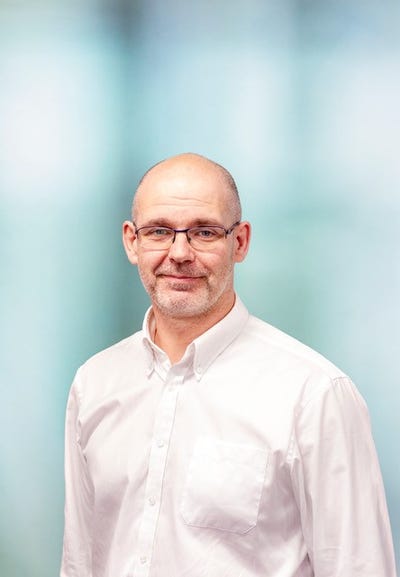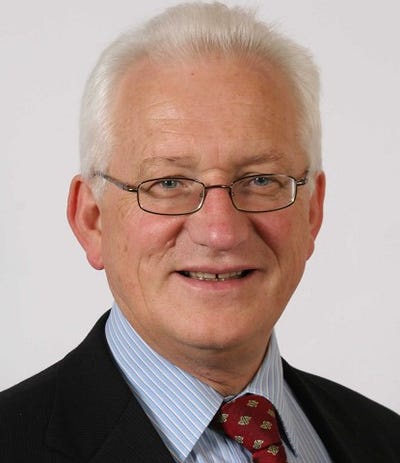Recycled Food-Grade Polypropylene Ready for Primetime
Favorable life-cycle data and backing by Greiner Packaging UK, Unilever, and other companies support the next step in commercializing food-grade rPP.
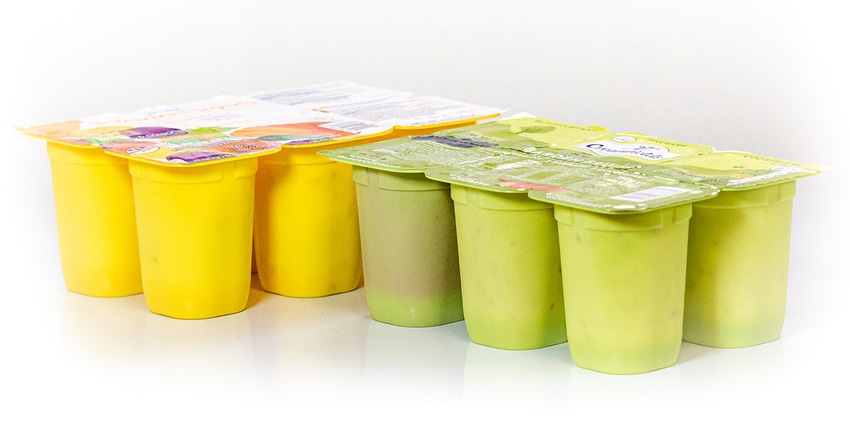
Signing up our milestone 30th participant for NextLOOPP is an ideal opportunity to share the initial findings from the preliminary Life Cycle Assessment review of the process.
In short, this technology results in recycling food-grade polypropylene (PP) into food-grade rPP.
Using Nextek’s two core technologies, PolyPRISM for sorting and PPristine for decontamination, an assessment that focused on the greenhouse gas (GHG) savings was conducted by the Natural Resources Institute at London’s University of Greenwich. PolyPRISM is the development of invisible UV-fluorescent markers used on the labels that, once placed on food-grade packaging, can be used to sort food from non-food packaging. PPristine is a two-stage process to decontaminate PP in the melt and solid state to remove any residual chemicals. The current data relating to the manufacture of virgin PP indicates GHG emissions of 2,000 to 3,000kg per tonne of polymer produced.
By contrast, the mechanical recycling process of the Nextek technologies saves up to 80% of virgin PP production emissions; in fact, early estimations are 324kg CO2 per tonne of food-grade recycled PP (FGrPP). This is broken down as 35.0kg from transport, 81.5kg from the sorting and washing process, and 207.5kg from the extrusion and decontamination stage.
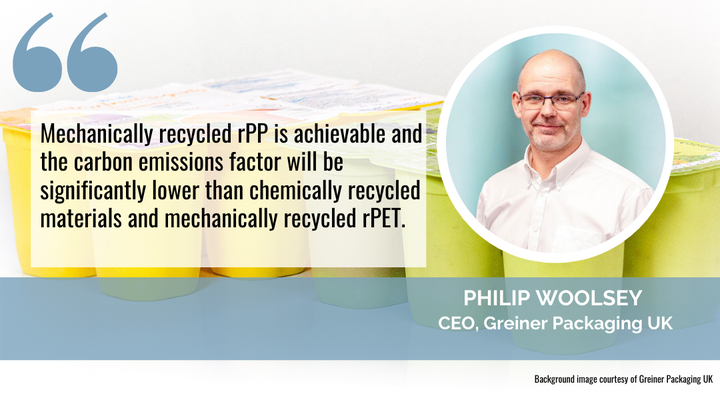
As things progress, we expect other beneficial impacts from mechanical recycling. These will include the impact of shifting away from a reliance on landfills and reduced use of polymers in energy recovery, as well as the GHG impacts associated with the extraction of crude hydrocarbons used as feedstock for virgin PP.
Chemical recycling of polymers is an alternative process technology that converts polymers into either random or regular hydrocarbon fragments (oils or monomers), then reforms and purifies these fragments into feedstock for repolymerization into new plastics. This technology is not yet scaled up nor widely commercialized for polyolefins like PP; as well, PE and yields higher capital, operating costs, and GHG emissions.
However, in time chemical recycling could become an option for heavily contaminated materials because uncontaminated materials can be recycled mechanically with larger CO2 saving, though we are still a long way from achieving this.
According to Philip Woolsey, UK CEO, Greiner Packaging and one of NextLOOPP’s participants, the need to include recycled content in plastic packaging has been top of mind for several years across the UK supply chain. Greiner was one of the founding members of the UK Plastic Pact, which set four overarching objectives to create a circular economy for plastics, one of which was to increase average recycled content to 30%.
As one of the larger producers of plastic packaging, Greiner saw it as a responsibility to be part of the solution. As media and consumers continue to post negative comments about plastics, Woolsey felt strongly that it is only those who work in the supply chain who can create meaningful change.
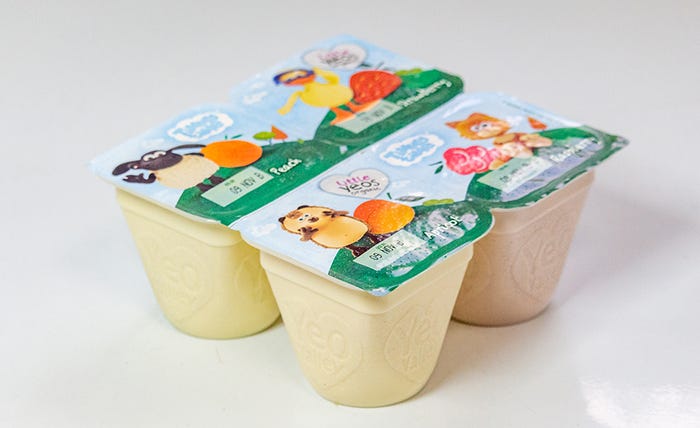
In 2018, there really was only one choice to include recycled content in food packaging: recycled PET aka rPET. Greiner’s PET products at that time contained no recycled content — it was not required by the customer and there was no commercial motivation. Today all of Greiner’s products are at or moving to a minimum of 30% recycled content. This was driven by the UK Plastics Pact and the UK government’s introduction of the UK Plastic Tax.
Because most of Greiner’s product range was manufactured from virgin PP, the company found it impossible to purchase food-grade recycled PP from any source. Thus, it invested to optimize use of reliable rPET to meet customer needs.
The company was also mindful that availability of rPET for the manufacture of pots, tubs, and trays packaging was bound to become scarce — and expensive — as demand for the material increased. Griener also understood that the large drinks companies would be increasing their use of rPET.
Chemically recycled rPP.
About 18 months ago chemically recycled rPP became available at a small scale and at a price point, which limits commercial viability a few products and customers.
Yet the material has the potential to be part of circular economy solution. Greiner fully expects chemically recycled rPP to increase in capacity and for prices to fall.
This is where the carbon argument becomes highly relevant to the future outlook for materials.
Based on Greiner’s understanding of global carbon emission factors, the packaging supplier calculated that virgin PP production CO2 emissions were about 45% less than producing virgin PET. Even though mechanically recycled rPET has a lower emissions factor than virgin PP, Greiner found that replacing a virgin PP product with a 30% rPET product would increase the emissions factor by 26%.
Indeed, it was calculated that to reach a “neutral” carbon emission required having more than 50% rPET, which created a problem. Greiner wants to move to carbon neutrality as they see this as ultimately more important for the planet, but it also needs to include a minimum of 30% recycled content in the company’s plastics packaging to avoid taxes and thereby achieve the commitments in the UK Plastics Pact.
Which is why Woolsey sees NextLOOPP as the perfect solution.
“We know that it is a challenge to create mechanically recycled food-grade rPP, but so is every worthwhile achievement,” he explains. “Our initial understanding is that mechanically recycled rPP is achievable and will not only attain EFSA and FDA approval for food use, the carbon emissions factor will be significantly lower than chemically recycled materials and mechanically recycled rPET. And, last but certainly not least, it will be potentially more commercially viable than other options.”
Woolsey ultimately sees a future with rPET and rPP and chemical recycling in the marketplace to enable circularity to be created. As he points out, it is not an either/or choice, which is why they are investing heavily to serve customers with either product.
About the authors
Edward Kosior, PhD., has had 46 years’ plastics recycling expertise, split evenly between 23 years as an academic and 23 years working in the industry. Kosior has been instrumental in designing numerous modern recycling plants and has achieved a number of patented recycling breakthroughs. He founded Nextek Ltd. in 2004 to provide consultancy services to assist in the strategic approaches to sustainable packaging.
Philip Woolsey has been CEO of Greiner Packaging UK since June 2016, with responsibility for all commercial and operational activities of the packaging business in the UK and Ireland. Woolsey has 15-year history in the packaging industry in both paper and plastics across commercial, technical and operational roles.
About the Author(s)
You May Also Like


